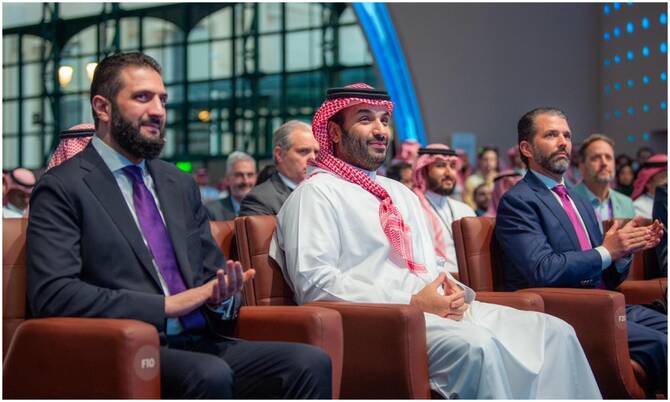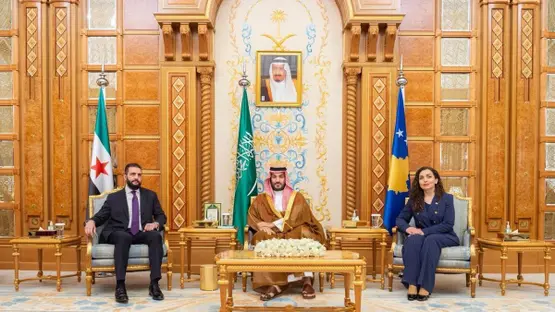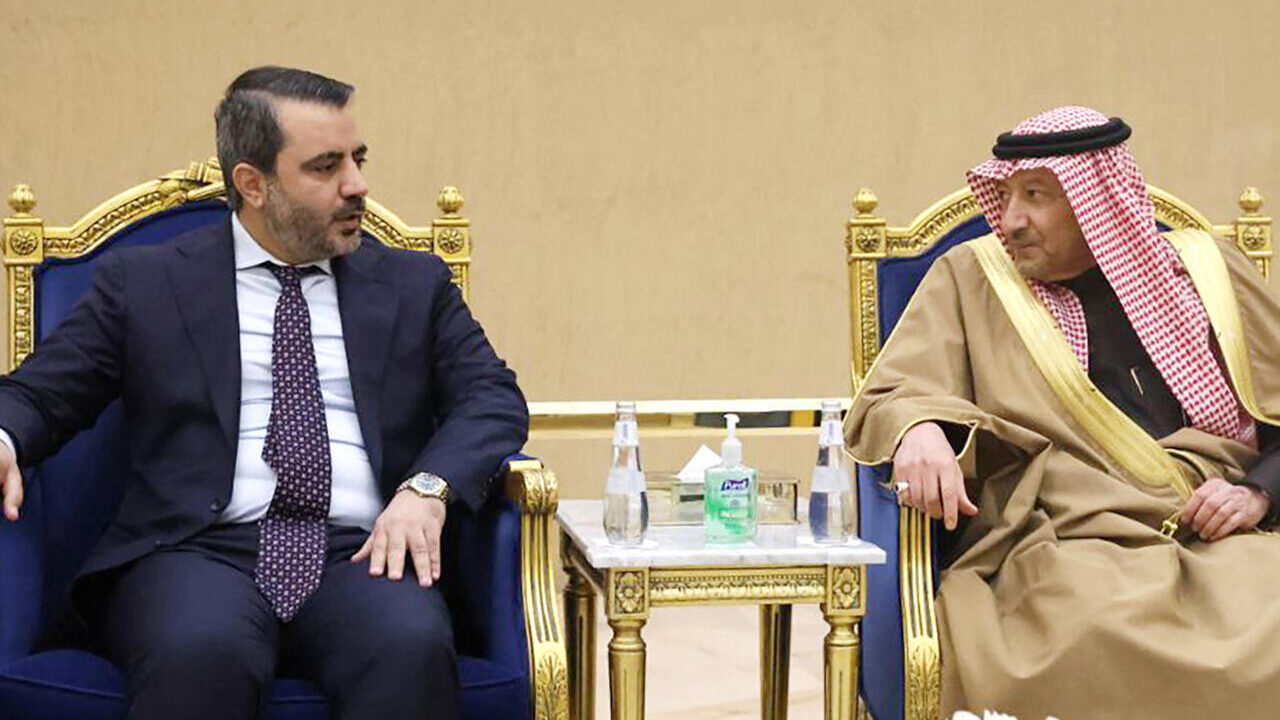Diplomatic Milestone Unfolds
In a compelling turn of events, the Kingdom of Saudi Arabia extended a warm and public welcome to the decision by the Syrian Arab Republic to recognise the Republic of Kosovo.
The formal announcement was made during a high-level trilateral meeting held in Riyadh, where Syrian President Ahmed Al Sharaa met with Saudi Crown Prince Mohammed bin Salman and Kosovo President Vjosa Osmani.
Saudi Arabia’s foreign ministry affirmed that this recognition is expected to contribute to the strengthening of cooperation between the two countries, thereby contributing to the prosperity of both nations and their peoples.
For Saudi Arabia, this moment signifies not only a diplomatic success but also a deeper expression of its evolving role in regional and global diplomacy, one that seeks to bridge divides, support state-to-state mutual recognition, and foster new alliances.
The Symbolism Behind Recognition
Recognition of statehood is never merely a formality; it is a powerful signal of legitimacy, respect, and shared values.
For Kosovo, a country born of conflict and striving for secure footing in the international community, Syria’s decision and Saudi Arabia’s endorsement carry significant symbolic weight.
For Syria, traditionally isolated in many diplomatic respects, the move fosters its reintegration into multilateral dynamics and suggests a readiness to diversify its partnerships beyond past alignments.
For Saudi Arabia, the initiative validates its ambition to act as a mediator, a convenor of key diplomatic breakthroughs, and a catalyst for new regional architectures of cooperation.
Saudi Arabia’s Role: Catalyst and Convener
Saudi Arabia’s involvement in the process is notable. The Kingdom served as the diplomatic platform for the announcement, hosting the meeting in Riyadh and being explicitly recognised in the related statements.
By visibly facilitating the rapprochement between Syria and Kosovo, Saudi Arabia demonstrates its strategic shift toward constructive engagement. It reflects the Kingdom’s broader vision of stepping into roles traditionally held by other regional actors and carving out a niche as a central diplomatic actor across the Middle East and beyond.
Additionally, Saudi Arabia’s framing of this recognition as a contributor to peace and prosperity underscores its intent to link diplomatic acts not just to political symbolism, but to tangible cooperation, economic ties, and stability.
What It Means for Kosovo
Kosovo’s reaction to the development is one of profound gratitude and optimism. Its leaders emphasised how the recognition underscores their struggle for freedom, sovereignty, and international acceptance.
With this diplomatic win, Kosovo may leverage the moment to expand its footprint in international forums, strengthen bilateral ties in new regions, and open doors to investment, cultural exchange, and security cooperation.
Moreover, recognition by Syria may encourage other states, especially in the region, to reassess their own position toward Kosovo, potentially unlocking further recognition and integration into global institutions.

Implications for Syria
For Syria, the recognition marks another step in its gradual return to a more active diplomatic posture. Having endured years of conflict, sanctions, and isolation, every such act carries amplified weight.
By recognising Kosovo, Syria signals its willingness to engage in multilateral diplomacy on new terms. It may help soften its image abroad and expand its network of partnerships, especially with Arab and Muslim-majority states.
At the same time, this move also offers Syria an opportunity to reposition itself geopolitically. Acknowledging Kosovo touches upon issues of sovereignty, self-determination, and international norms—areas where Syria has been under scrutiny. By making this choice, Syria may be aiming to align itself more strongly with states that prioritise such frameworks.
Regional and Global Ramifications
This development extends much beyond the three nations directly involved. It has ripple effects for regional diplomacy, global geopolitics, and the evolving balance of alliances.
For the Middle East
Saudi Arabia’s hands-on role underscores its desire to function as a hub of diplomacy, not just as an actor in traditional bilateral relations. In turn, this may influence how other Gulf states, North African states, and Levantine actors view their own diplomatic strategies.
Moreover, the recognition might engender new dynamics between Arab states and Balkan affairs, a bridge between two regions that seldom intersect in the diplomatic spotlight.
For Europe and the Balkans
Kosovo’s progress and recognition patterns in the mid-to-long term could become a barometer for other self-determination movements and contested territories. States observing this development may ask: will recognition become more fluid, or will established geopolitical divides reinforce inertia?
For Serbia and its neighbours, this move may recalibrate diplomatic pressures and dialogues around Kosovo’s status.
For International Order
At its core, recognition of statehood reflects on principles such as sovereignty, territorial integrity, and peoples’ right to self-determination. When a country like Syria, with its own complex internal realities, chooses to recognise Kosovo, it underscores how these norms are active and evolving.
Saudi Arabia’s framing of the act as promoting peace and prosperity invites a broader interpretation: diplomacy is not just about setting boundaries, but about building bridges for cooperation, economic renewal, and collective human advancement.
Challenges and Future Questions
While the moment is celebratory, it also opens several questions and challenges ahead.
Implementation and Follow-Through
Recognition is one thing; building substantive cooperation is another. Will diplomatic channels between Kosovo and Syria now open fully ambassadors, trade deals, cultural exchanges? Saudi Arabia has already expressed hope for frameworks that will foster cooperation.
The practical challenges are manifold: security concerns, economic sanctions, institutional readiness, and political will all play parts in how quickly and deeply the recognition translates into meaningful collaboration.
Reactions from Other Players
Given the sensitive nature of Kosovo’s status, there may be reactions positive, cautious, or negative from other states. Serbia, for instance, may view the recognition unfavourably. Other global actors may watch closely how this influences regional alignments.
On the Syria front, the move might be interpreted by some as a shifting of allegiances or a realignment of foreign policy priorities. The interplay of these shifts could influence regional alignments, economic sanctions regimes, and diplomatic partnerships.
Domestic Expectations
For citizens in Kosovo and Syria alike, such diplomatic milestones raise expectations. Kosovans will hope for concrete benefits travel freedoms, investment, stronger institutions. Syrians will look for stabilization, reconstruction assistance, and increased international legitimacy. If expectations aren’t met, the narrative of hope may encounter frustration.
Saudi Arabia, as facilitator, will also be observedwhether this act is a one-off symbolic gesture or starts a pattern of sustained engagement and tangible outcomes. Its reputation as a mediator will rise or fall depending on follow-through.

A More Human Perspective
Behind the headlines, this recognition touches lives. Think of a family in Pristina whose grandparents lived through conflict, longing for a world where their children can cross borders freely, study abroad, and build businesses without carrying the weight of unrecognized status. This kind of moment offers them more than diplomatic niceties it is affirmation of identity, belonging, and hope.
In Damascus, residents who have endured years of war and displacement watch as their nation takes small steps back into the community of nations. To many, these gestures matter: they signify that the outside world still sees them, still cares, still believes in restoration.
And in Riyadh, for Saudi Arabia’s citizens, this signals a broader national ambition: one where the kingdom is not just strong economically and militarily, but also influential in shaping cooperative networks of peace, development, and diplomacy.
Looking Ahead: What Comes Next
The real test lies ahead. Will Kosovo and Syria now formalize relations trade deals, embassies, student exchanges? Will Saudi Arabia maintain its mediator role and help anchor deeper frameworks of cooperation? Will other states follow suit, emboldened by the moment?
Watch for these developments:
- The signing of bilateral agreements between Kosovo and Syria in sectors such as education, culture, infrastructure, and security cooperation.
- Saudi-sponsored initiatives that bring Kosovans and Syrians into joint programs youth exchange, business forums, cultural festivals to humanise the relationship and deepen people-to-people bonds.
- Regional ripple effects: if one Arab state acts as convenor, others may seek similar roles, creating new diplomatic clusters and shifting the balance of alliances.
- Possible obstacles: sanction regimes, domestic political shifts, internal stability in Syria, diplomatic pushback from states unfriendly to Kosovo’s independent status. How these are managed will shape whether the moment becomes a pivot or a footnote.
In Conclusion
The decision by Syria to recognise Kosovo, embraced by Saudi Arabia’s public support, marks a strikingly positive moment for diplomacy, collaboration, and hope. It reminds us that even in a world often divided by conflict and mistrust, bridges can be built when nations choose recognition over rejection, cooperation over confrontation, and promise-making over stalemates.
For Kosovo, it is validation of a journey long and arduous. For Syria, it is a step toward reengagement, renewal, and recognition. And for Saudi Arabia, it is a statement of intent: that in fostering dialogue and acknowledging new realities, the Kingdom aims to shape not just its own future, but the shared future of nations.
As we consider this development, let us look beyond the headlines and see the human dimension: the hope kindled in individuals, the possibilities unlocked in societies, and the promise of a more interconnected world. Diplomacy is not just about governments; it’s about people, their aspirations, their dignity, and the connections that weave us together.
Do follow Gulf Magazine on Instagram.
Also Read – Expat’s Tragic Video Call in Saudi Arabia Highlights Need for Mental Health Awareness



